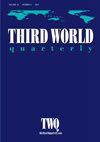Nation-state strategies for human capital development: the case of sports mega-events in Qatar
IF 1.8
2区 经济学
Q2 DEVELOPMENT STUDIES
引用次数: 2
Abstract
Abstract The paper makes an original contribution to knowledge in three ways. First, through interviews with experts in Qatar, we uncover the role major sports events seek to play in the development of Qatar’s indigenous population. Our findings show that, alongside seeking to achieve various international objectives, these events are also intended to have a positive impact on the state’s human capital development at home. Specifically, in this regard, there is a desire to use sports events to address issues related to the health of Qataris, and to try to engage citizens in a process of maturity, whereby they are encouraged to confront the outside world, and become less reliant on the state. Second, our paper adds to understanding the role of aspirations, motivation and ambition in the human capital development process, which, as we show, is an area to which a growing literature is devoted. Third, the paper is the first academic analysis to provide insight into how sports events can be used in an attempt to overcome the ‘resource curse’, referring to the evidential long-term human capital development deficiencies that are commonly experienced by natural resource-rich states across the Middle East, Asia and Africa.人力资本发展的民族国家战略:以卡塔尔大型体育赛事为例
本文从三个方面对知识做出了原创性贡献。首先,通过对卡塔尔专家的采访,我们揭示了重大体育赛事在卡塔尔土著人口发展中所扮演的角色。我们的研究结果表明,在寻求实现各种国际目标的同时,这些事件也旨在对国家在国内的人力资本发展产生积极影响。具体而言,在这方面,希望利用体育赛事来解决与卡塔尔人的健康有关的问题,并努力使公民参与一个成熟的过程,从而鼓励他们面对外部世界,减少对国家的依赖。其次,我们的论文增加了对抱负、动机和抱负在人力资本开发过程中的作用的理解,正如我们所展示的,这是一个越来越多的文献致力于的领域。第三,本文是第一个学术分析,提供了如何利用体育赛事来克服“资源诅咒”的见解,指的是中东、亚洲和非洲自然资源丰富的国家普遍经历的明显的长期人力资本发展不足。
本文章由计算机程序翻译,如有差异,请以英文原文为准。
求助全文
约1分钟内获得全文
求助全文
来源期刊

Third World Quarterly
DEVELOPMENT STUDIES-
CiteScore
4.10
自引率
15.00%
发文量
137
期刊介绍:
Third World Quarterly ( TWQ ) is the leading journal of scholarship and policy in the field of international studies. For almost four decades it has set the agenda of the global debate on development discourses. As the most influential academic journal covering the emerging worlds, TWQ is at the forefront of analysis and commentary on fundamental issues of global concern. TWQ examines all the issues that affect the many Third Worlds and is not averse to publishing provocative and exploratory articles, especially if they have the merit of opening up emerging areas of research that have not been given sufficient attention. TWQ is a peer-reviewed journal that looks beyond strict "development studies", providing an alternative and over-arching reflective analysis of micro-economic and grassroot efforts of development practitioners and planners. It furnishes expert insight into crucial issues before they impinge upon global media attention. TWQ acts as an almanac linking the academic terrains of the various contemporary area studies - African, Asian, Latin American and Middle Eastern - in an interdisciplinary manner with the publication of informative, innovative and investigative articles. Contributions are rigorously assessed by regional experts.
 求助内容:
求助内容: 应助结果提醒方式:
应助结果提醒方式:


